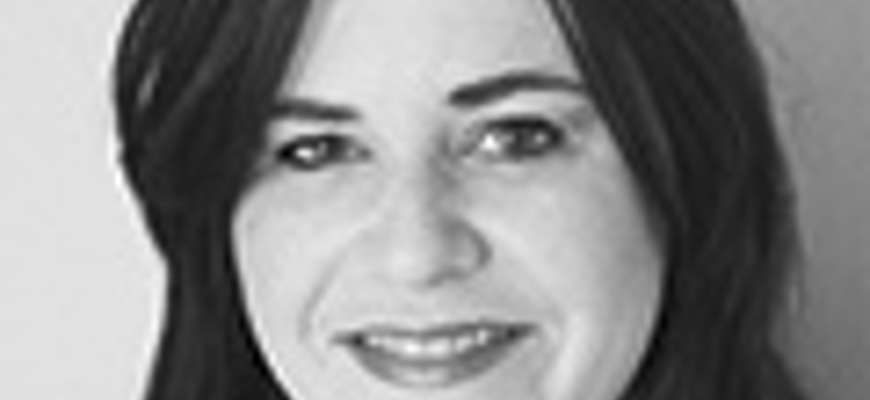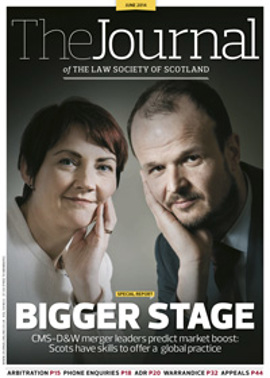Games-time goals

What was your career path to your current role?
I began as a corporate M&A solicitor with Maclay Murray & Spens, then went in-house and have been ever since – over 12 years. I tend to work in organisations with complex funding structures or undergoing considerable change or growth, such as the Student Loans Company. I also worked in the software industry as general counsel for a Scottish/US group whose target clients were in the oil and gas industry.
I joined the Games Organising Committee in November 2008. It is a private limited company which receives significant public funding and raises private revenue. The Games has multiple stakeholders and vested parties, which makes it a very interesting delivery model. We work hard to balance the interests of them all to ultimately deliver an outstanding Games.
How is your in-house team structured? Do you have a seat at the strategy table?
I was the first lawyer into the Organising Committee and will be the last out. We now have a team of 14, including secondees, split intolegal and brand protection. It’s a modest centralised team, partly of secondees from Harper Macleod, Glasgow 2014’s official legal advisers. During the Games, some of the team will be able to experience Games-time roles; however, at all times we retain a legal department. I also oversee the brand protection function. During Games-time, this team will grow to more than 130, including police, trading standards personnel as enforcement officers, and volunteers. The legal team is divided into four core areas that support the 69 functional areas of the business:
(1) corporate (marketing, employment, volunteering, procurement);
(2) Games-time delivery (key operational functions such as sport, security, venue management, transport, accommodation etc);
(3) commercial (sponsorship and broadcasting rights, ticketing and licensing/merchandising);
(4) special projects (ceremonies, Queen’s Baton Relay and the Glasgow 2014 cultural programme).
In strategic terms, I have led both the development and the operational delivery of legal services and brand protection. I have reviewed most of the other business area strategies as they have been developed, and continue to play a role attending the Organising Committee’s board meetings, audit and risk committees and as a key reviewer and approver on most of Glasgow 2014’s approval groups.
Describe a typical day in your job.
As you would imagine in such a diverse and dynamic environment, every day is different, with a wide range of subject areas and deadlines. I liaise with business areas to ensure legal and brand protection are playing their part in smooth delivery of our Games objectives. A key priority is managing contractual risk. I meet regularly with the executive team, manage issues and risks, and ensure proper governance at approval groups.
I currently devote considerable time to ensuring the dissolution strategy is in place and dissolution activities are identified before the Games (including how contracts will be closed post-Games), especially as large numbers of team members will leave the organisation very quickly, having fulfilled their roles.
If there is one thing we can’t change it is the Games start date, so the pressure is on to deliver: this leads to early starts and late finishes. My schedule is chaotic, definitely not for the faint-hearted, but I have become adept at reprioritising and juggling my time as matters arise.
What gets you up on a Monday morning?
My three-year-old daughter (the eight-year-old won’t get up!).From a work perspective, the great pride (and responsibility) associated with knowing I’m a small part of a big machine that will deliver the biggest multi-sport event Scotland has ever seen. I look forward to it every day and have never experienced such a varied role. There are not enough hours in the day, so the earlier into the office, the better.
How have you met the challenge of building a team, and an organisation, from scratch?
It’s not been so much about knowing the answers from the start, as knowing where to find them. I contacted the legal team of London 2012 as soon as I started, and they were very helpful. They were ahead of us timewise and, although their event was on a bigger scale, there were clear synergies and legacy that could be transferred (by way of knowledge).
I had to get up to speed really quickly with the business of hosting a multi-sport event, and spent time reading and applying a lot of lessons learned from previous Games. As an observer at the Vancouver 2010 Winter Paralympics, I learned more about delivering brand protection operational support, following which I was asked to manage that team. As knowledge develops, you become far more relaxed about delivery models and much more concerned with delivering.
What do you like most and least about working in-house?
I love the commerciality. Recently I heard an in-house lawyer refer to himself as a “commercial person with a legal background”. I completely agree. I enjoy a detailed understanding of the business that delivers an international multi- sport event. Working in-house is liberating, you can be a self-started and your input can really help to craft delivery across the business.
I’m really passionate about my work, but becoming consumed in the commercials can be a double-edged sword and lead to in-house lawyers being involved in matters that are not strictly legal. It’s fun, but you’re invited to every meeting (whether or not there’s a legal requirement). For some, this can become a distraction, and you can make an industry out of being busy rather than achieving your own legal deliverables. A lot depends on the personality and ability of the in-house lawyer to manage this.
What makes a good in-house lawyer? What’s your advice for young lawyers?
My advice would be to spend some of your time in private practice, as there are skills you learn in a firm that assist greatly when you go in-house. Find your niche area in private practice and then take that learning and professional discipline and apply it in-house.
To work in-house, you’ve got to be a self-starter, have confidence and know your subject matter. You’ve got to be able to challenge and hold your ground, but be commercial. Confidence and knowledge are key – to ensure you hold credibility and trust in-house, you must show you have acquired these skills somewhere down the line. My private practice days were extremely valuable, as I took a specific skillset with me in-house.
What do you look for when you get external legal advice?
I demand high standards from my team and external advisers. I expect external advisers to give advice as though they were in my shoes. I require specific, solution-orientated, clear advice. To achieve this, external lawyers need to take time to understand my business thoroughly: I don’t want charged for time spent getting up to speed.
In-house lawyers require bespoke, specific training to support them in their roles, and I look to external lawyers to provide a programme of relevant training for the in-house legal team (and other areas of the business such as HR and procurement).
I have a budget to manage, so I also pay particular attention to cost transparency from externals – a pet hate is a six-minute charge for reading an email. I demand a lot, but I work hard to achieve a transparent relationship with advisers. It’s a partnership and I like to make sure external lawyers get what they need too. I also often look for secondment support, as this helps (particularly in a complex business) with knowledge transfer.
What are the current hot topics in sports law and events?
Ensuring the commercial attractiveness of events such as ours is a hot topic for me. Sporting events need to be commercially viable and reach out to different demographics and a wide audience.
Achieving legacy is another. It’s a very important time for hosting sporting events in the UK, following London 2012, Glasgow 2014 and the Ryder Cup (to name only a few). We have a huge range of world-class sports facilities in Scotland and across the UK, so it is important to maximise our opportunities and resources.
We also need to inspire young people to take up and enjoy sports. Major events can inspire in so many ways. At the Vancouver 2010 Paralympics, I was blown away by visually impaired skiers hurtling down a mountain with only verbal instructions via an earpiece. Para-sports are the most inspirational thing you could see; they are integrated into our programme so I’m looking forward to that.
What is the future for in-house legal teams?
I believe the future will be very buoyant and businesses will continue to value in-house legal staff. In-house lawyers have great capacity to diversify into other commercial areas of a business, as they have portable skillsets. We’re starting to see titles such as “Head of Legal and Commercial”, and lawyers moving into more commercial and operational roles.
I would certainly work in-house again. I enjoy the autonomy, opportunity and breadth of work. For me, after the Games, it will be difficult to find a comparable job, but what’s definite is that I will be taking a really long holiday.
Do you offer placements for students or secondments for young lawyers?
We haven’t taken students, but had trainees from Harper Macleod, our legal advisers and sponsors, as secondees. Ours is a finite project, publicly funded, so we rely on Harper Macleod to make sure their summer students and trainees have a chance to be part of the Games.
How do you think in-house lawyers today are perceived among the wider legal profession?
Private practice lawyers perhaps view in-house lawyers as more legal generalists than specialists. In part that may be true – we have to manage a variety of matters and, if I require unique or specialised advice, I often go to external experts.
What keeps you busy outside of work?
I have two daughters (aged eight and three), a 28-year-old stepson and his daughter, and a husband too! I own my own network marketing business and I co-founded a charity called Rainbow Valley (www.rainbowvalley.org.uk), which helps people affected by cancer. I work hard and play hard and I seem to attract a great number of different things that make me a pretty busy lady in and outside of work.
In this issue
- “It is a wise father...”
- Let the Games begin
- Power for change: EHRC's litigation strategy
- Framework for tribunal reform
- MIAMs: making meetings the end?
- Legal locksmiths: locking and unlocking charitable gifts and bequests
- Reading for pleasure
- Opinion: Marjory Blair and Kirsty Miguda
- Profile
- Book reviews
- President's column
- The big day unveiled
- Identity crisis?
- Arbitration: the way forward in disputes?
- A brand new framework
- Hello? Hello?
- A mediation story: The Mediator's Log
- ADR: Faculty makes its pitch
- Justifying extensions
- Season of change
- Beneficial changes
- Stormy waters
- Which way will it jump?
- People on the move
- Games-time goals
- Acceptance or warrandice?
- Getting ready for the "designated day"
- Turning concern into action
- Ask Ash
- Here comes 2012
- Ploughing a lone furrow
- Safety in networking
- Law: an insight job
- Sheriff decision causes power of attorney alert
- Law reform roundup
- "Find a registered paralegal"






